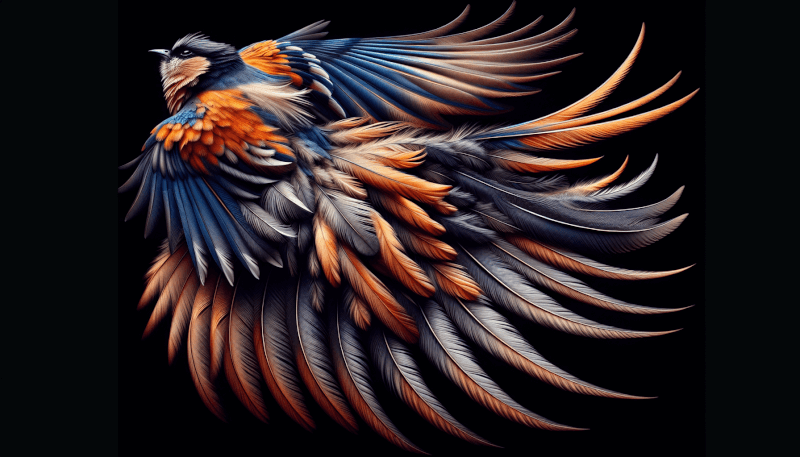If you’re a bird enthusiast or own a feathered friend as a pet, maintaining their wing and feather health is of utmost importance. A healthy set of wings and feathers allows birds to fly effortlessly and exhibit their natural behaviors. In this article, we will explore some of the top supplements that can contribute to the overall wing and feather health of birds. From essential vitamins to oils and seed blends, these supplements will help keep your feathered companions soaring high and looking their best.

Introduction
Taking care of your bird’s wing and feather health is essential for their overall well-being and happiness. Wings and feathers play a crucial role in your bird’s existence, enabling them to fly, protect themselves from the elements, attract mates, and indicate their overall health. In this article, we will explore the importance of wing and feather health, as well as discuss the top supplements that can help enhance and maintain their condition.
1. Importance of Wing and Feather Health
1.1 Enhances Flight and Mobility
The ability to fly is one of the most defining features of birds. It allows them to explore their environment, find food, escape predators, and experience a sense of freedom. Healthy wings and feathers are vital for maintaining their flight and mobility. Feathers that are well-nourished and free from damage allow for efficient aerodynamics, ensuring your bird can soar through the skies effortlessly.
1.2 Protection against Elements and Injury
Feathers act as a protective shield, guarding birds against external elements such as rain, wind, and extreme temperatures. They also serve as a physical barrier against injuries by cushioning the impact of collisions and providing a layer of insulation. Proper wing and feather health significantly reduce the risk of developing illnesses or getting hurt while navigating their surroundings.
1.3 Influences Breeding and Mating
Bright and vibrant feathers play a vital role in avian courtship rituals. Birds with healthy plumage are often seen as more attractive to potential mates. Brightly colored feathers indicate vitality and good health, and they signal to potential partners that a bird is robust and genetically fit. Maintaining the health of your bird’s wings and feathers can greatly enhance their chances of successful breeding and mating.
1.4 Indication of Overall Health
The condition of a bird’s feathers is a reliable reflection of its overall health. Feathers that are dull, frayed, or have irregular patterns may signify underlying health issues, poor nutrition, or inappropriate living conditions. Regularly observing and maintaining your bird’s wing and feather health can aid in the early detection of any possible health concerns, allowing for timely intervention and treatment.

2. Vitamin Supplements
2.1 Vitamin A
Vitamin A is crucial for overall feather health and the growth of new plumage. It helps maintain the integrity of feathers by supporting keratin production, the protein responsible for feather strength and structure. Lack of vitamin A can result in brittle feathers, impaired feather growth, and even feather plucking. Including a vitamin A supplement as part of your bird’s diet can help promote healthy wing and feather development.
2.2 Vitamin E
Vitamin E is a potent antioxidant that plays a vital role in protecting feathers from oxidative damage. Feathers constantly face exposure to UV radiation and environmental pollutants, which can lead to feather degradation. Supplementing your bird’s diet with vitamin E can help combat these harmful effects and maintain their vibrant plumage.
2.3 Vitamin D
Vitamin D is essential for the absorption and metabolism of calcium, a mineral vital for feather strength and integrity. Calcium deficiency can lead to weak feathers, feather deformities, and issues with molting. Boosting your bird’s vitamin D levels through appropriate supplementation can ensure their feathers remain strong and healthy.
2.4 B-Complex Vitamins
B-complex vitamins, including Biotin (B7) and Niacin (B3), are crucial for maintaining healthy feathers. These vitamins help regulate metabolism, promote cell growth, and aid in the synthesis of keratin. Including a B-complex vitamin supplement in your bird’s diet can improve feather quality, enhance feather coloration, and prevent issues such as feather picking.
3. Mineral Supplements
3.1 Calcium
Calcium is a vital mineral for maintaining optimal feather health. It is necessary for the formation of strong and properly structured feathers. Calcium deficiency can lead to thin, brittle feathers that break easily. Including a calcium supplement in your bird’s diet can help prevent feather abnormalities and encourage healthy feather development.
3.2 Zinc
Zinc is an essential mineral that aids in the synthesis of keratin, the protein building block of feathers. It also helps maintain the health of the skin underneath the feathers. A deficiency in zinc can result in weak feather shafts, frayed feathers, and impaired feather growth. Adding a zinc supplement to your bird’s diet can promote strong and healthy feathers.
3.3 Copper
Copper is crucial for the formation of melanin, the pigment responsible for feather coloration. Without adequate copper levels, feathers may appear dull and lack vibrancy. Copper deficiency can also lead to delayed molting and feather abnormalities. Supplementing your bird’s diet with copper can help maintain their feather color and ensure proper feather growth.
3.4 Selenium
Selenium is a trace mineral that acts as an antioxidant, protecting feathers from oxidative damage. It is involved in the production of melanin, which plays a role in feather coloration. Selenium deficiency can result in improper feather growth, discoloration, and feather deformities. Including a selenium supplement in your bird’s diet can help maintain vibrant and healthy feathers.
3.5 Iron
Iron is essential for maintaining healthy blood cells and promoting oxygen transportation throughout the body, including the feather follicles. Iron deficiency can cause a lack of pigmentation in feathers, resulting in pale or faded colors. Supplementing your bird’s diet with iron can promote feather coloration and prevent pigment-related issues.

4. Essential Fatty Acids
4.1 Omega-3 Fatty Acids
Omega-3 fatty acids are crucial for maintaining feather health and reducing inflammation. They play a crucial role in the structure and flexibility of feathers. Including a source of omega-3 fatty acids, such as fish oil or flaxseed oil, in your bird’s diet can help promote glossy, lustrous feathers.
4.2 Omega-6 Fatty Acids
Omega-6 fatty acids are necessary for feather development and providing essential moisture to the skin and feathers. Including a source of omega-6 fatty acids, such as safflower oil or sunflower seeds, in your bird’s diet can help prevent dryness, maintain feather suppleness, and reduce the risk of feather breakage.
5. Amino Acid Supplements
5.1 Methionine
Methionine is an essential amino acid that plays a crucial role in feather growth and structure. It is a building block for the proteins that make up feathers. Methionine deficiency can result in slow feather growth, weak feathers, and feather deformities. Including a methionine supplement in your bird’s diet can promote healthy feather development.
5.2 Lysine
Lysine is another essential amino acid that aids in feather synthesis and maintenance. It is involved in the production of collagen, a protein that provides structural support to feathers. Lysine deficiency can lead to poor feather quality, improper feather growth, and feather-related disorders. Supplementing your bird’s diet with lysine can improve feather strength and overall feather health.
5.3 Arginine
Arginine is an amino acid that supports feather growth and maintenance. It is involved in the production of nitric oxide, which promotes blood flow to the feather follicles. Arginine deficiency can result in delayed molting and impaired feather growth. Including an arginine supplement in your bird’s diet can support healthy feather development and ensure proper molting.

6. Herbal Supplements
6.1 Dandelion
Dandelion is a beneficial herb known for its liver-supporting properties. A healthy liver is essential for optimal feather quality and feather coloration. Including dandelion as an herbal supplement in your bird’s diet can aid in detoxification and promote healthy feather growth.
6.2 Milk Thistle
Milk thistle is another herb with potent liver-protecting attributes. It helps maintain liver health and protect against oxidative stress. By supporting liver function, milk thistle can contribute to improved feather quality and overall wing and feather health.
6.3 Burdock Root
Burdock root is a herbal supplement known for its detoxifying properties and its ability to improve skin and coat conditions. Healthy skin plays a crucial role in feather health, as it is the foundation upon which feathers grow. Including burdock root in your bird’s diet can help promote a healthy skin and feather coat.
7. Protein Supplements
7.1 Collagen
Collagen is a protein that provides structural support to various tissues, including feathers. Supplementing your bird’s diet with collagen can help strengthen their feather shafts and improve overall feather quality. Collagen supplements are available in various forms, including powders and hydrolyzed collagen peptides.
7.2 Pea Protein
Pea protein is a plant-based protein that is easily digestible and rich in amino acids essential for healthy feather growth. Including pea protein in your bird’s diet can support feather development and promote strong, vibrant feathers.
7.3 Spirulina
Spirulina is a nutrient-rich blue-green algae that provides a wide range of nutritional benefits. It is rich in essential amino acids, vitamins, and minerals that are essential for feather health. Including spirulina as a protein supplement in your bird’s diet can help maintain optimal feather condition and support overall health.

8. Probiotic Supplements
8.1 Lactobacillus acidophilus
Lactobacillus acidophilus is a beneficial bacteria that supports digestive health and aids in nutrient absorption. A healthy digestive system ensures proper nutrient uptake, which directly impacts feather health. Including a probiotic supplement containing Lactobacillus acidophilus in your bird’s diet can promote a healthy gut microbiome and improve feather quality.
8.2 Bifidobacterium bifidum
Bifidobacterium bifidum is another beneficial bacteria that helps maintain a balanced gut flora. A well-balanced gut environment is crucial for nutrient absorption and overall health. Supplementing your bird’s diet with a probiotic containing Bifidobacterium bifidum can support healthy digestion and enhance feather quality.
8.3 Saccharomyces cerevisiae
Saccharomyces cerevisiae, a type of yeast, is known for its probiotic properties. It supports digestive health and enhances nutrient absorption. Including a probiotic supplement containing Saccharomyces cerevisiae in your bird’s diet can improve feather quality by promoting optimal digestive function.
10. Additional Considerations
10.1 Regular Grooming
In addition to providing appropriate supplements, regular grooming is essential for maintaining your bird’s wing and feather health. Gentle feather cleaning, trimming overgrown feathers, and inspecting for any signs of damage or issues should be part of your routine. Regular grooming helps prevent feather abnormalities, keeps feathers in optimal condition, and promotes a strong bond between you and your bird.
10.2 Balanced Diet
While supplements can be beneficial, it is crucial to remember that they should not replace a balanced diet. Your bird’s primary source of nutrients and essential components for wing and feather health should come from a high-quality, species-appropriate diet. Consult with an avian veterinarian or avian nutritionist to ensure your bird’s diet is meeting their specific nutritional requirements.
10.3 Stress Reduction
Stress can negatively impact your bird’s overall health, including their wing and feather condition. Provide a safe and enriching environment for your bird, including appropriate perches, toys, and socialization opportunities. Minimize sudden environmental changes and address any potential stressors to promote a calm and stress-free living environment.
10.4 Environmental Enrichment
Enrichment activities that mimic a bird’s natural behaviors can help promote wing and feather health. Providing opportunities for flight, climbing, exploration, and foraging can help keep your bird mentally stimulated and physically active. Mental and physical stimulation contribute to overall well-being, enhancing feather quality and promoting a happy and healthy bird.
In conclusion, maintaining wing and feather health is an essential aspect of caring for your avian companion. By understanding the importance of wing and feather health and providing the appropriate supplements, you can ensure your bird’s wings are strong, their feathers vibrant, and their overall well-being optimized. Remember to consult with an avian veterinarian for guidance on specific supplements and to tailor your bird’s care regimen to their individual needs. With proper care and attention, your bird will enjoy a life filled with graceful flight and beautiful feathers.


